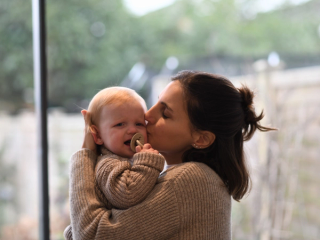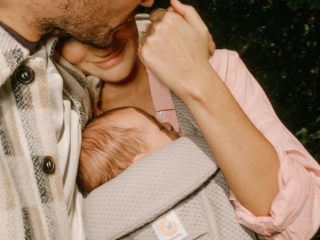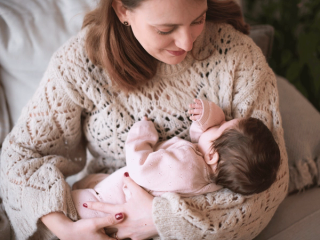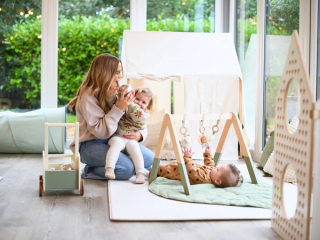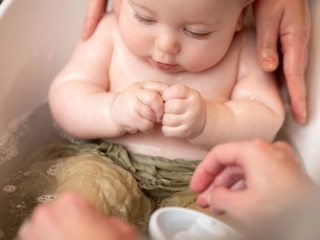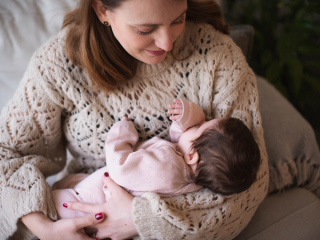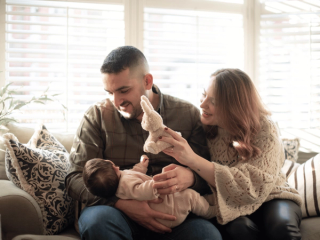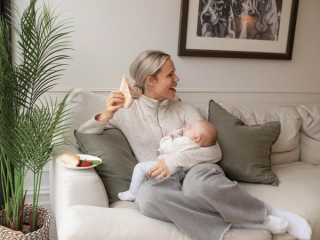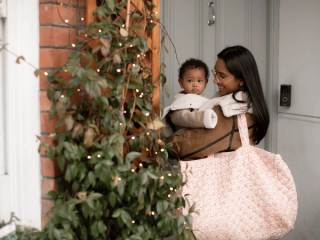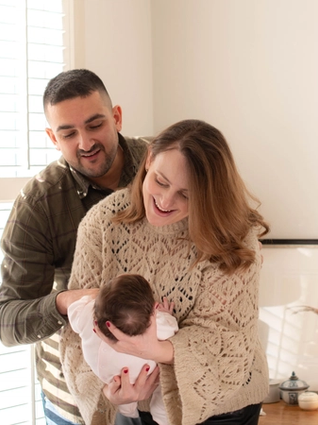
- Home
- Advice Hub
- Newborn
- New Parent Support
- How To Bond With A Newborn
How to Bond With a Newborn
The first 24 hours with your newborn are a magical experience. At HiPP, we've curated a list of tips & advice on how to build a bond with your little one.
The importance of bonding with a newborn
What to expect in the first 24 hours
Tips for how to bond with your baby in the first 24 hours
How to bond with your baby 24 hours onwards
Common struggles parents face when bonding with their newborn
Struggling with a newborn and feelings of anxiety
Struggling with a newborn and feelings of depression
How to overcome those struggles
As a parent, bonding with your baby begins before they are even born. All those times you talk to them in utero, share music with them, and rub that cute baby bump all contribute to forming a strong, secure relationship. Once they’re out in the world, though, bonding with your baby should be more of a two-way street, right? All the attention you pay them will be reciprocated. You’ll talk, they’ll listen. You’ll touch, they’ll respond. Well…not straight away.
The first days and weeks with your newborn can be a wild ride and things won’t always go as you expect. Some people experience a magical, instant connection with their baby, but for many others it takes time to build a bond. That’s ok. In this article, we’ll give you some ideas for how to bond with your newborn, and what to do if you feel like it’s a bit of a struggle.
The importance of bonding with a newborn
Building a bond with your newborn sets you both up for a solid emotional connection that will last a lifetime. The bond formed in these early months promotes a healthy parent-child relationship and a general sense of wellbeing, which contributes to greater confidence, resilience and an ability to handle strong emotions. Of course, developing this bond isn’t the work of the few hours or days after your baby is born – but those first days are important, which is why it’s recommended to have some quiet time together after the baby is born. Whether you’re at the hospital or at home, this time is precious as you both recover from the upheaval of labour and delivery.
During the first hours after birth, mums are encouraged to spend as much time with their babies as possible in skin-to-skin contact. If you're planning on breastfeeding it’s also a good idea to aim to feed during this time – if you are able to. Breastfeeding not only provides nutrition for the baby but also helps to promote bonding.
What to expect in the first 24 hours
After your baby is born, if all is well, you should immediately be given the opportunity to hold your baby skin-to-skin. This is a great way to bond with your new baby and also help them regulate their body temperature and heart rate. If your baby needs to go to special care baby unit remember you can and will still get your beautiful bonding experience a little later on. It's never too late to have skin-to-skin and truly take them in while they're nestled into your body.
As mentioned, you’ll also be able to start breastfeeding during this time. Breastfeeding is a great way to bond with your baby through the release of oxytocin (the “love hormone”) and provides them with the nutrients they need. If you aren't breastfeeding, do remember any kind of feeding is an opportunity to bond with your baby. Get up nice and close and have skin-to-skin during a bottle feed too. Try to limit the amount of people who feed your baby. Responsive bottle feeding is also recommended.
You and your baby will be offered a 'top to toe' check by a midwife and or a doctor. This does what it says on the tin! After these checks your care provider will be able to offer advice on the need for any further checks or tests and discuss your postnatal plan.
Depending on where you have your baby, the healthcare professionals will either leave your home within a few hours or you will be transferred to another ward, usually the postnatal ward.
Tips for how to bond with your baby in the first 24 hours
However smoothly your labour and delivery go, giving birth is exhausting – and it comes at the end of a period of discomfort and often disturbed sleep, so it’s not like you go into parenthood operating at full capacity. It’s really important that you give yourself time to breathe and just be with your baby, so you have the opportunity to start adjusting to this new stage of your life.
Delaying visitors
Of course you want to show off your new baby, and it’s natural people will want to visit you – and you’ll want their help and support! But for the first 24 hours, why not keep it just you, your partner, and your baby, so you don’t feel any pressure to host or ‘perform’. If you give birth in a hospital and all is well with mum and baby, the likelihood is you’ll be sent home with 24 hours of giving birth. Making visitors wait until you’ve had a night in your own home will give you a bit more chance to settle into parenting and keep all those first baby cuddles to yourself.
Making eye contact
Making eye contact with your baby helps your baby learn to recognise your face, while also enabling you both to learn each other’s facial expressions and how to interpret them. In the early days, your baby won’t be able to focus very well, but within two weeks your newborn’s eyesight will have improved and soon enough they will spot you from across the room and respond to your visual cues.
Responding to cries
Contrary to what some people might try to tell you, you cannot spoil a newborn. Responding to their cries is a big part of bonding with your baby and providing the reassurance they need to feel secure in their environment. Babies usually cry because they’re uncomfortable – perhaps they’re hungry, tired, cold, wet, or they have tummy pain – so try to meet their needs and give them comfort.
Skin-to-skin contact
Skin-to-skin contact provides physiological benefits in the first minutes and hours after birth but continues to provide comfort throughout the newborn months – especially if your baby needs soothing. Skin-to-skin contact is one of the best ways to bond with your baby and you might find that this close contact is one of the quickest ways to calm them (and you) down when they’re distressed.
Talk to your baby
Your newborn will already know the sound of your voice because they’ve been listening to you talk since their hearing first developed in the womb! Talking to them helps reassure them, strengthens the bond between you, and helps their brain development. You don’t need to have anything important to say – even just narrating your day, singing or reading to them will all help.
How to bond with your baby 24 hours onwards
As the days pass and you acclimate to the feed/change/sleep cycle, you can still work to strengthen the bond with your newborn by continuing all of the above – skin-to-skin, cuddles, chatting, responding to their needs, eye contact, etc. When you’re ready, you can also introduce new opportunities for bonding with your baby, such as bathtime, massage and playtime.
Tummy time
Tummy time is important to your baby’s development because it helps them develop the muscles and skills they need to move their bodies, support their heads, and eventually sit, crawl and walk. It’s also an opportunity for a change of perspective – to see the world, their toys and even you differently. When your baby is really tiny, you can do tummy time on your chest, but once they’re a bit older you can do tummy time on the floor, on the bed or on your lap. Try giving your little one different thing to capture their attention – whether that’s something to look at, listen to, or touch – to encourage them to lift their head and eventually also their shoulders and back, building that core strength.
Playing
Newborns don’t play in the way that older babies do, but that doesn’t mean you can’t engage them in sensory experiences that help their brain development. Exploring things like music, bubbles, pretty lights or other sensory experiences together will only strengthen your bond and help you discover new ways to enjoy your time together.
Baby massage
Baby massage is a beautiful, relaxing way to bond with your newborn. You can incorporate it into a bedtime routine, use it to soothe your baby when they’re unhappy, or simply enjoy it after a nappy change. Watch videos on YouTube to see the best strokes to relax your baby or take them along to a baby massage class when they’re old enough. Many are open to babies from 6 weeks old.
Building routine
All babies are different and there’s no telling what kind of baby you’re going to get. Very few babies will fall into a routine in the first few weeks of their life, but that doesn’t mean that you can’t have a routine if you find it helps you – even if that routine is just ‘after a nappy change, we do a bit of massage’ or adding a bath and story into the evening. Implementing a proper bedtime routine can usually wait until about the 2 – 4 month mark once you’ve all settled in a bit and your baby’s feeding and sleeping patterns have become a bit more predictable.
Bath time
Bath time can be a fun and relaxing way to bond with your newborn. Many babies enjoy bathtime, which provides a range of sensory experiences while still being relatively gentle. If your baby is not a happy camper in the bath, try changing things up – it might be that a different time of day, natural light, or a warmer room could make the difference.
Common struggles parents face when bonding with their newborn
Being a new parent is unbelievably hard. Perhaps people tried to tell you that when you were pregnant, but until you’re faced with the realities of sleep deprivation on top of a post-natal body and in addition to the general overwhelm that comes with this ginormous new responsibility, it’s really very hard to imagine just how challenging it is. If you’re struggling, be kind to yourself. It’s no failure to admit that it’s hard and to accept whatever help you’re offered – or go looking for support if you’re not getting what you need.
Struggling with a newborn and feelings of anxiety
It’s entirely normal to feel anxious in the face of a new and unknown responsibility. Babies are mysterious creatures who lack all but the most basic means of communication and often present with unexplained conditions like a weird rash or an endless bout of crying just when you feel at your most vulnerable. Your midwife, GP or health visitor will be able to help you with medical questions about your baby, but it’s also important to give yourself a break – some time to ponder whether your anxiety is coming from a genuine worry or just from a buildup of no sleep.
If your anxiety extends beyond what’s right in front of you and doesn’t resolve when your questions are answered, it might be that you need more support. Talk to your partner and your healthcare professionals to get the help you need.
Struggling with a newborn and feelings of depression
In the first few weeks after your baby is born, your hormones are all over the place and most new mums will find themselves feeling very tearful or anxious. This is commonly known as the baby blues – not to be mistaken for postnatal depression. The baby blues shouldn’t last beyond the first two weeks. If you continue to feel down beyond that time, or if your symptoms begin later, you could be suffering from postnatal depression, which affects about 1 in 10 women in the year after they give birth.
Feelings of depression
Postnatal depression can be very serious but it is also treatable, so it’s really important to open up to people about how you’re feeling and get help as soon as you can. Having postnatal depression does not make you a bad parent and isn’t a sign that you’ve done anything wrong – it can happen to anyone. Being diagnosed with postnatal depression doesn’t automatically mean you’ll be given medication – that’s just one of a number of options you can discuss with your GP.
Parental pressure
In these days of living life online, it can be easy to fall into the trap of thinking everyone else is doing parenting better than you – or that you should meet some kind of social media standard in order to be a good parent. This can push you to do things before you’re ready, or make you feel inadequate for things that are perfectly normal – like having a mountain of laundry or not remembering to stock up on nappies.
Social media can also be great for providing a community of people experiencing the same thing as you – but it’s worth reflecting on how you feel after you’ve spent time on these apps. If they’re not providing a source of joy or support, why not take them off your phone for a while until you feel more robust?
In real life, you will always meet people at baby groups whose babies are sleeping better than yours, or hitting their milestones ahead of yours, or who generally look like they’re coping better than you are. But you’ll also meet plenty of people who feel overwhelmed and are also behind on laundry and life admin. Finding your people will be a huge source of strength and support – not just through the baby days, but through every stage – so it’s worth putting in a little bit of effort to try and build these friendships, whether that’s by attending local baby groups or meeting up with people from your antenatal classes.
Struggling with birth trauma
Whether or not you had a ‘difficult’ birth, it’s a major life event and one that will stay with you for months, if not years, to come. Another advantage of meeting other parents is that you’ll have other people who’ve recently been through the same thing. You can share your stories and help each other process your experience.
If your delivery was particularly traumatic, however, you might need to talk to a professional. Your healthcare team can point you to the right support to help recover from birth trauma and, if needed, the proper avenues to make a formal complaint.
Above all, be kind to yourself. It’s entirely natural that a traumatic birth would have an impact on your life and on how you bond with your baby – there’s no shame in that.
How to overcome those struggles
Parenting takes a village – but the village doesn’t always come with the baby. While many new parents are fortunate enough to be surrounded by friends and family, many feel isolated by their new lives and don’t have the support they need to feel secure in their parenting journey. It’s important to be open with your partner and whoever else makes up your support network about how you’re feeling, and also to build the village you want for your family by trying to connect with other people who are going through the same things you are.
Equally important is to go easy on yourself and not hold yourself to the impossible standards so often represented on social media. Remember that this is not a competition, and every baby is unique. Try to think how you would respond to a friend who came to you with the same worries and be as kind to yourself as you would be to them. And most of all, remember that all of this is just a phase; it won’t last forever.

